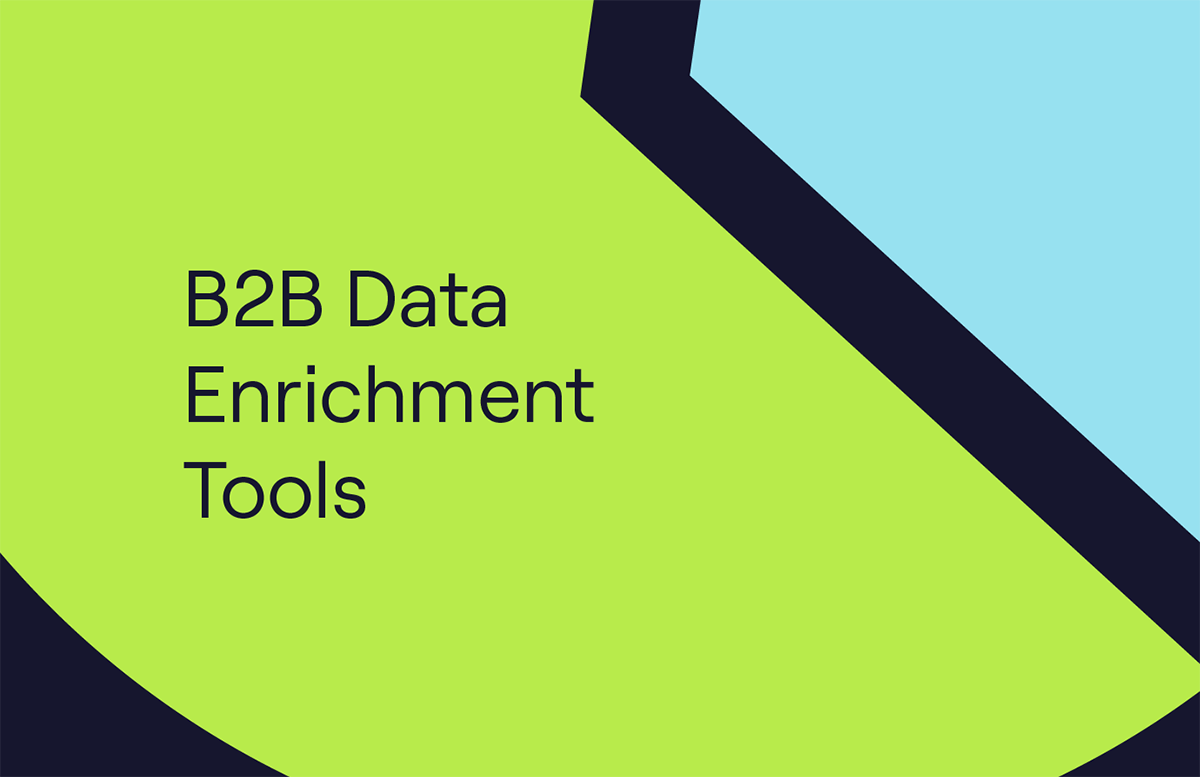Compliant GTM Tech Stack: Boost Revenue and Stay Protected
GTM tech stack resources:
One question should be front and centre for every B2B revenue team: How compliant is your GTM tech stack?
It’s no longer enough to have large volumes of contact data. If it’s not ethically sourced, properly enriched, and fully aligned with laws like GDPR, your outbound strategy could risk your brand and your pipeline.
In this guide, we’ll discuss what a compliant data stack really looks like, where most teams unknowingly fail, and how to turn compliance from a legal headache into a commercial advantage.
What is a GTM tech stack?
A go-to-market (GTM) tech stack consists of tools and software that help a company launch a product or service in a new market. It includes the B2B technologies sales, marketing, and customer success teams use to acquire, engage, and retain customers. The tech stack is the backbone of the customer journey, from initial contact to post-sale support.
A typical GTM stack includes:
- Data & enrichment tools: To source prospects, verify contacts, and enrich CRM records.
- CRM & sales engagement platforms: For managing outreach, calls, and sequences.
- Marketing automation: For demand gen, email nurturing, and inbound conversion.
- Compliance infrastructure: Including consent tracking, opt-out routing, and DNC screening.
- Analytics & CDPs: For attribution, segmentation, and full-funnel visibility.
A well-structured GTM stack improves cross-functional team alignment, shortens sales cycles, and increases outbound efficiency. But without compliance baked in, even the best stack becomes a liability.
Why is a compliant GTM data tech stack important?
Most GTM leaders focus on performance metrics: speed to lead, meetings booked, pipeline created.
However, with global privacy laws tightening, compliance must sit at the heart of every tool and tactic, especially if you’re working with customer data.
Here’s why:
- Legal compliance: Data misuse is penalised by laws like GDPR (EU/UK), CCPA (California), and national DNC rules. Depending on severity and jurisdiction, fines range from $10K to $22M+.
- Brand trust: Respecting opt-outs, sending compliant emails, and avoiding spammy enrichment helps build brand integrity and increase response rates.
- Data quality: GDPR/CCPA-compliant data must be accurate, verified, and purpose-bound. Therefore, you should always start with cleaner contacts from day one.
- Revenue protection: Every outreach that breaches compliance risks legal action, CRM pollution, or pipeline loss.
Sales intelligence tools serious about compliance, like Cognism, help businesses avoid privacy risks and violations without slowing their go-to-market strategy. Take it from Henderson Scott 👇
Directeur informatique @Henderson Scott

Why GDPR compliance isn’t just a legal issue—it’s a revenue one
Some GTM leaders view compliance as a cost centre. But the truth? It’s a growth multiplier.
- Better data = better targeting: Accurate, compliant data fuels precision outreach.
- Fewer spam complaints: Your emails land where they should, and get opened.
- Less CRM clutter: Verified contacts reduce time-wasting dials and dead-end cadences.
- Boosted deliverability: Compliant opt-ins improve sender reputation and email placement.
Cognism’s edge: Its compliance-first data ensures higher response rates, cleaner workflows, and faster sales cycles.
The result: less noise, more revenue.
Many teams treat data compliance as something to “tick off” with legal, separate from pipeline performance or sales execution.
However, your approach to GDPR directly impacts how effectively you generate, engage, and convert leads.
Here’s why having a compliant tech stack is a revenue driver, not just a regulatory box:
1. Better deliverability means better engagement
Clean, permission-based email lists result in higher open and reply rates.
That’s because compliant data is more likely to be accurate and actively monitored, keeping your sender reputation strong and your sequences performing.
2. Higher connect rates = more meetings
When your phone data is sourced ethically and regularly verified (like Cognism’s Diamond Data® verified mobiles), your team spends less time dialling dead numbers and more time speaking to the right prospects.
That translates into more meetings, faster.
3. Relevant targeting improves conversion
GDPR-compliant data isn’t just legal, it’s intentional.
With proper sourcing, consent and enrichment, you’re more likely to reach people who actually want to hear from you.
That means higher-quality conversations and fewer wasted touches.
4. Trust leads to faster deals
Trust is a competitive advantage in markets like the UK, DACH or EMEA.
Showing that your business respects privacy and handles data correctly builds credibility with legal, procurement, and decision-makers alike.
Thus, your deals are more likely to move forward rather than stall.
5. Avoiding risk protects your pipeline
A non-compliant data incident doesn’t just invite legal trouble; it can stall outbound campaigns, damage brand trust, and drain resources to clean up the mess.
Building your GTM motion on a compliant foundation protects everything you’ve worked to build.
Bottom line?
Compliance isn’t the cost of doing business; it’s a revenue multiplier.
The sooner you align your GTM technology stack to privacy standards, the faster and more efficiently you can grow.
What does a compliant GTM data stack really mean?
A compliant GTM data stack ensures that every contact record your sales and marketing teams use is collected, processed, and enriched to meet data privacy laws, most notably GDPR in Europe and DNC regulations in markets like the UK, France, Germany, and the US.
But compliance isn’t just a legal checkbox. It’s about protecting your brand, safeguarding your outreach effectiveness, and future-proofing your go-to-market strategy.
This means every tool, workflow, and dataset must adhere to the following principles:
- Consent-driven acquisition: B2B data should be collected under opt-in or legitimate interest, depending on the jurisdiction.
- DNC screening: Phone and SMS records must be scrubbed against national Do Not Call registries, such as TPS (UK) or DNC lists in the US and Canada.
- Transparent usage: Prospects must be notified when their data is processed, with opt-out mechanisms communicated.
- Regulatory alignment: The stack must support GDPR (EU/UK), CCPA (California), CASL (Canada), and others.
- Data hygiene: Data should be verified, refreshed regularly, and managed with proper expiration controls.
Many providers claim to be “GDPR-ready”, but very few deliver on every part of this checklist.
If your current GTM tech stack includes platforms that rely on scraping, crowdsourced contact info, or offer no visibility into compliance workflows, it’s time to ask:
Are we taking on more risk than we realise?
Where most GTM stacks go wrong with compliance
Even well-intentioned go-to-market teams can unknowingly operate with non-compliant data, primarily when relying on vendors who trade volume for precision.
The result? Legal exposure, deliverability issues, and a growing risk of reputational damage.
Here are the most common compliance gaps we see in GTM technology stacks:
1. No subject notifications
Under GDPR, if you’re processing personal data you didn’t collect directly, you’re legally required to notify the data subject. Many data providers skip this entirely, or leave it to you to handle manually.
2. Lack of DNC list screening
In many European countries, calling someone on a national “Do Not Call” list without prior consent is a regulatory offence. Few data vendors check against DNC registries, putting your B2B sales team at risk of outbound violations.
3. Reliance on scraped or crowdsourced data
Some low-cost providers pull contact information from public directories, social media, or web scraping tools without clear consent or a lawful basis. If this data enters your CRM, your company becomes the data controller and is legally liable.
What’s more, this data is often of poor quality. Your reps will spend more time attempting to connect with the correct contact than making sales. And, if you’re buying an email list, the data will likely cause high bounce rates and lower your domain reputation.
👉 Are buying email lists worth it?
4. No straightforward opt-out process
Every data subject must have the ability to opt out easily. If your data provider doesn’t facilitate this or your internal workflows don’t make it visible, you may breach GDPR or CCPA regulations.
5. Expired or decaying data
Stale data isn’t just a productivity killer; it’s a compliance issue. Using outdated contact info increases the risk of sending unsolicited emails or calling the wrong numbers, potentially triggering complaints or formal reports.
The bottom line?
If your provider can’t demonstrate how they source, verify and notify data subjects, they’re likely exposing your GTM tech stack to risk, and passing that liability onto you.
Why you should choose Cognism for your GTM tech stack:
Cognism was built with compliance in mind from the start, ensuring that you’re prospecting risk-free when you use our B2B data.
Cognism is GDPR and CCPA compliant and scrubs all mobile numbers against:
- TPS/CTPS lists in the UK.
- Do-Not-Call lists in the USA, Canada, Australia and European countries, including Germany, France, Spain, Ireland, Belgium, Croatia, Portugal, Sweden, and more. (The most out of any provider)
The platform also follows these compliance-based actions:
- A stringent B2B data verification process.
- Ensures all data is legally sourced and high quality.
- Provides users with a notified database.
/Cognism%20Product%20-%20Compressed/sales-companion-compliance-webp.webp?width=500&height=500&name=sales-companion-compliance-webp.webp)
How to assess your GTM data stack for compliance
If you’re not 100% confident that your go to market tech stack is compliant, now is the time to audit it.
The good news?
You don’t need to be a privacy lawyer to get started. You just need to ask the right questions and expect clear answers from your providers.
Here’s a quick checklist to help you assess the compliance health of your GTM data stack:
/GTM%20stack/GTM-data-stack-compliance-checklist.webp?width=1200&height=1200&name=GTM-data-stack-compliance-checklist.webp)
1. Is your phone data screened against DNC lists?
You must check your prospecting lists against national Do Not Call registries whenever you dial. Cognism screens phone numbers across 13 countries, more than any other B2B data provider.
2. Is consent documented and accessible?
You should be able to ask your provider:
- How did you obtain this contact?
- When?
- On what legal basis?
If they can’t answer or won’t, you’re taking on unnecessary liability.
Marketing Manager @Environmental Services Company
3. Does your provider issue subject notifications?
Under Article 14 of the GDPR, data subjects must be informed if their data was obtained indirectly.
If your provider isn’t sending notifications or expecting you to do it, you’re at risk.
4. Can you offer opt-outs easily and visibly?
Compliance includes giving data subjects the ability to opt out at any time.
That means email footers, unsubscribe pages, and internal processes to reflect those choices in your systems.
5. Is your data regularly verified and updated?
Outdated or incorrect data isn’t just inefficient, it can become non-compliant.
Ask your provider how often their data is refreshed and whether enrichment is available to keep your CRM up to date.
6. Is an audit trail available?
Could you show a regulator how you handled a specific contact’s data? Your systems should offer an auditable record of notifications, consent, enrichment, and suppression.
6. Is an audit trail available?
Could you show a regulator how you handled a specific contact’s data?
Your systems should offer an auditable record of notifications, consent, enrichment, and suppression.
7. Is team training in place?
Compliance isn’t just about tools; it’s about behaviour.
With annual training, you can ensure your SDRs and marketers understand the basics of lawful prospecting, subject rights, and data handling best practices.
This assessment can serve as a quick internal audit of your GTM tech stack tools or as a conversation starter with your current provider.
If the answers aren’t clear, it may be time to explore alternatives.
Workflow use cases for your go-to-market tech stack
Your GTM technology stack is only as powerful as the workflows it enables.
Here’s how Cognism fits into real revenue-driving motions, while keeping compliance at the core:
1. Outbound prospecting with compliant contact data
Challenge:
SDRs waste time calling expired or DNC-listed numbers.
Solution:
- Use Diamond Data® mobile numbers.
- Screen calls across 13 DNC lists in real-time.
- Trigger outreach only to contacts with verified compliance status.
Result:
Fewer failed dials, higher connection rates, zero legal risk.
%20Hub/Headshots/tristan-jones-headshot.webp)
2. Account-based marketing (ABM) that respects opt-outs
Challenge:
ABM emails and ads sometimes target contacts who’ve opted out or haven’t consented.
Solution:
- Sync only compliant records into ABM platforms.
- Honour subject preferences and opt-outs.
- Use GDPR-approved legitimate interest as a targeting basis.
Result:
Improved campaign performance and lower risk of brand damage.
%20Hub/Headshots/tim-hughes-headshot.webp)
3. Sales territory planning based on GDPR-safe signals
Challenge:
Global SDRs often target countries with different privacy laws, causing confusion and risk.
Solution:
- Segment leads by geography and compliance type (GDPR, CCPA, etc.).
- Assign reps only to regions where legal data is available.
- Ensure every contact has a mapped compliance context.
Result:
Territory execution at scale without regulatory violations.
4. CRM enrichment without compliance gaps
Challenge:
Enriching contacts in Salesforce often adds unverified, non-compliant data.
Solution:
- Sync enriched contacts directly into your CRM.
- Preserve original consent, opt-out, and DNC metadata.
- Set refresh cycles to remove expired contacts proactively.
Result:
A cleaner, leaner, compliant CRM that fuels smarter workflows.
5. Intent-based outreach that converts faster
Challenge:
SDRs reach out blindly without knowing if prospects are actually in-market.
Solution:
- Combine Cognism’s compliant contact data with Bombora intent signals.
- Prioritise accounts showing high buying intent for your ICP keywords.
- Route verified contacts with live intent into email or call sequences.
Better timing, higher conversion rates, and more pipeline from fewer touches.
%20Hub/Headshots/rico-luis-headshot.webp)
Job role: SDR
Improve close rates with intent signals
Use this play to:
6. Competitive displacement with clean data and sharper targeting
Challenge:
Reps waste time trying to poach accounts already locked into other vendors, without insight into decision-maker turnover or tech stack changes.
Solution:
- Identify companies using competitor tools via tech install data.
- Enrich accounts with Diamond Verified® contacts, including new decision-makers.
- Combine intent signals and job changes to time your outreach perfectly.
- Trigger outreach sequences specifically tailored to known competitor pain points.
Result:
Higher win rates in competitive deals, reduced churn from stale data, and more effective displacement of underperforming tools.Why it works: Cognism provides verified contact data and competitive intelligence, so you strike when accounts are ready to switch.
%20Hub/Headshots/ellie-childs-headshot.webp)
The risks of non-compliance in B2B prospecting
In the rush to hit pipeline targets and business goals, compliance can sometimes feel like a blocker. However, overlooking it can result in far greater legal and commercial consequences.
If your GTM technology stack isn’t compliant, you’re not just breaking rules. You’re undermining the efficiency and reputation of your entire revenue operation.
Here’s what’s at stake:
1. Regulatory fines
Laws like the GDPR, UK PECR, and country-specific DNC regulations carry real financial penalties.
For example, contacting a prospect in France or Germany without checking national DNC lists can result in fines, even if the data was purchased in good faith.
👉 How to Successfully Run GTM Strategies in France
👉 How to Build Successful GTM Strategies for the DACH Market
2. Deliverability and domain reputation damage
Suppose you’ve got an email automation tool as part of your tech stack but haven’t gotten consent to send marketing emails. In that case, you may risk sending large numbers of non-compliant emails, which can lead to high bounce rates, spam complaints, and blacklisting.
This doesn’t just hurt one marketing campaign; it damages your sender reputation across all marketing and sales emails in the long term.
3. CRM bloat and bad data
When low-quality or unverified customer data flows into your CRM, it bloats your systems and introduces inaccuracies.
This often happens when teams look at technographic data providers that sell inexpensive data in high volumes. But all this does is fill your CRM with data that’s more likely to be unverified duplicates.
Your team wastes time on dead numbers, irrelevant personas, and stale accounts, all of which slow down outbound performance.
4. Prospect trust erosion
Compliance isn’t just a legal issue; it’s a brand issue.
If your prospect finds out their data was scraped, bought without consent, or used without proper notification, you lose credibility before the first conversation even begins.
5. Sales inefficiency
Outreach built on unreliable or non-compliant data results in wasted dials, missed ICPs, and poor conversion. That’s not just inefficient, it’s expensive.
A compliant data stack doesn’t slow you down; it protects your performance. The most effective revenue teams treat compliance as a foundation for trust, not a last-minute legal check.
Instead, choose fresh, accurate data from the start. Choose Cognism as your customer data platform.
Cognism reduces legal exposure by providing legally sourced data, minimising CRM noise with Diamond Verified® contacts, and giving GTM teams higher-quality, compliant leads that convert.

Director of Business Development @SUB1

FAQs
Should startups and enterprises use different GTM stacks?
Yes. Startups typically need lean, integrated stacks prioritising speed, affordability, and ease of use.
Conversely, enterprise teams require scalable solutions, comprehensive compliance features, and integrations with complex CRM and RevOps ecosystems.
How often should I review or update my GTM tech stack?
Every quarter at a minimum. Fast-growing teams should review it monthly. You want to identify expired tools, adjust for process changes, and refresh your data and enrichment systems to prevent CRM bloat and outdated outreach.
How do I choose GTM tech stack tools?
Start with your goals: outbound prospecting, inbound conversion, or full-funnel orchestration.
Prioritise platforms that integrate well, support compliance, and automate manual tasks. Critically, ensure your data provider (like Cognism) meets GDPR, CCPA and DNC requirements before layering in outreach tools.
What tools should every GTM tech stack include?
Here is a GTM tech stack example:
- A compliant B2B data provider (e.g. Cognism).
- A CRM (like Salesforce or HubSpot).
- A sales engagement platform (like Outreach or Salesloft).
- A marketing automation platform (like Marketo or HubSpot).
- Consent and DNC compliance infrastructure.
- An analytics/CDP layer (like Segment or Hightouch).
What is the most overlooked part of a GTM stack?
Compliance infrastructure is often overlooked when building a product-led GTM tech stack.
Many teams forget to check if their enrichment tools or workflows align with GDPR or CCPA. Ignoring opt-out flows, DNC screening, or data expiration can expose you to fines, spam blocks, or deliverability issues.
Can I enrich GTM data while still staying compliant?
Yes, if your enrichment provider sources data legally, logs consent or legitimate interest, screens against DNC lists, and gives subjects visibility and opt-out control.
Cognism does all of this, making enrichment safe and sales-ready. 👇
Scale your GTM tech stack with Cognism
Data compliance is no longer optional; it’s a differentiator.
The most effective revenue teams don’t just tick legal boxes; they build compliant data into the foundation of their go-to-market strategy.
Why?
Because trust matters, accuracy matters. Every outbound motion, whether a cold call, a nurture sequence, or a new campaign, performs better when powered by verified, up-to-date, and responsibly sourced data.
At Cognism, compliance and performance go hand in hand. So if you want to enter new markets without a compliance headache, add Cognism to your GTM tech stack.
Book a demo today to discuss your GTM strategy needs and learn how Cognism can support it. 👇
%20Hub/Headshots/nicole-peters-headshot.webp)
%20Hub/Headshots/lee-gannon-headshot.webp)

/csv%20enrichment/csv-enrichment-card.webp)
